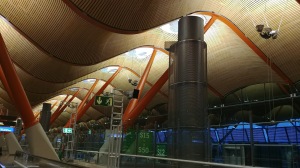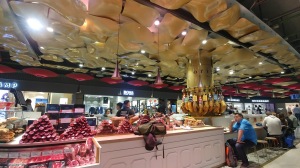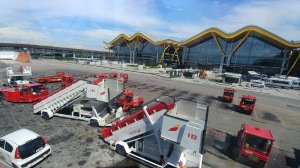Twenty-five years ago, I was wrapping up my first European foray. Spain, where I’d spent the semester in intensive Spanish language and literature classes; Santiago de Compostela, to be specific, that rainy northwest corner of Spain whose American counterpart Seattle stole my heart five years later.
Looking back, it is hard to believe that I undertook such an endeavor at nineteen. I was naive but trying hard to be brave. I was fortunately armed with a decade of Spanish language education. I insisted for years as a teenager on going to summer camps out of state on my own, so had mustered what skills I could in the American Midwest and on domestic flights, long roadtrips, Greyhound buses, and more.
It was my first transatlantic flight, and I deliriously journaled in my seat about my perceived shared affinities with Hemingway and Fitzgerald, headed over finally for my own continental chapter. No wonder my mother cried in the Oklahoma City airport, as I practically ran down the jetway that January. I had little room for sentiment and nostalgia. My view was full forward.
But I was ill-prepared for the mechanics of that trip. The flights were not good, the connection ridiculously short, then suddenly long, because I missed my short domestic flight to Santiago. I was waylaid in Madrid Barajas for twelve or fourteen hours, and berated by a frustrated Iberia customer service representative at a desk for my crappy Spanish. I was alarmed by the military atmosphere in the arrivals hall, freaked out by Spanish soldiers in camouflage uniforms pointing semi-automatic weapons down at the trudging travelers. The acrid smell of black tobacco stung at my nose. I am pretty sure I cried in the airport bathroom.
But I collected myself, and arrived in Santiago at midnight on a pouring January night with my overpacked bags. I was promptly ripped off by an exorbitant taxi fare thanks to the late hour, resulting in a loud dispute between the taxista and the hotel manager. I fell asleep for sixteen hours and the manager’s wife woke me up at four the next afternoon, nervously asking me if I was bien and did I need to check in with anyone, ¿tal vez tu madre?
There followed an adventurous, studious, joyous, and highly amused five months. Santiago embraced me. I quickly made friends and in no time was being shuttled to various Spanish homes for the weekend. I dated the eldest son of six children, Antonio, his sister Virginia my hallmate in the residencia, and became friends with the whole family, remaining so to this day.
I learned how to drink coffee, the value of a fresh-squeezed orange juice, porto and orujo and chupitos. The lemon curd pastries on the way to class, merluza a la romana – I ate so well that semester. The seafood! My midwestern palate prior to Santiago was totally unschooled, but I learned to crave octopus and mussels and oysters and clams, and especially the sweet long quadrangles of razor clams. Fresh shellfish that tasted of the sea and its salt. The dark tobacco that all the Spanish puffed then, boxes of Gitanos and Lucky Strikes that I tried unsuccessfully to socially smoke. (That “sticky gene” for smoking? I do not have it.)
I hitchhiked around Galicia with my boyfriend, I fell in love with the wild costa gallega with its rías altas and rías bajas – the high fjords of the northern coast, and low fjords to the west. I was very glad for my years in Spanish class. I experienced very little language or culture shock – I was simply delighted and amused, and learning. I went home to Oklahoma, throttled back to first gear, and hit a slump so hard that only campus overachieving would restart me.
I returned to Spain in 1995 for three weeks, in 2005 for six weeks, in 2013 for a week. But, still when I hear a peninsular Spanish accent, I wheel around to see where it is coming from, so great and deep was my exposure to the language that semester in Santiago. I know now that the peninsular accent sounds to latinos like a thick Scottish brogue sounds to Americans, “¡Venga! ¡Gracias! ¡Hasta luego!” But I heard so much of it that the immersion made its deep imprint.
I harbor a particularly warm allegiance to Spain and Spanish culture, and to my Spanish friends. So when I learned that, by some stroke of luck, my return trip from Philadelphia included a nice solid layover in Madrid Barajas thanks to serendipitous routing, I anticipated with pleasure this little Spanish culture hit.
I immediately sussed out my seatmate in flight. He was a Basque pharmacologist from Bilbao about my age who had just completed a three-month research project in Philadelphia at one of the teaching hospitals. Although I slept most of the flight, when I was coherent he was more than happy to chat Spanish politics (the prime minister Rajoy had just been forced out hours earlier), American culture observations, and compare travel stories with me. I laughed about the exuberant Spaniards in the row in front of us, and mentioned that Florentines would never be so unfiltered, preoccupied as they are with maintaining la bella figura. “Yeah, we don’t have that preoccupation,” he chuckled.
I stumbled through my italospagnolo with him, but like all Spaniards, he admired Italian culture, and so my grammar errors and fumbles were met with patience. I did not get a chance to say hasta luego and gracias for the welcome conversation and company on that transatlantic haul.
All the international flights that arrived in the early morning hours were emptying their passengers into the long terminal halls of the airport. The soldiers on camouflage with semi-automatic weapons are gone. The airport is now no-smoking. I did not feel like I was arriving on a military base in Afghanistan, scrutinized with suspicion. Madrid Barajas is now beautiful, and shines with the best of Spanish design, all wood and curves, in a sensual yet spacious welcome.
 |
| Pre-dawn concourse, Madrid Barajas. |
We eventually made our way into the arrivals hall to be processed for immigration. A Spaniard in a blue suit stood at the top of the line, calling out “¿pasaportes europeos? ¿Venga aqui vale? ¿Vale? ¿Vale? ¿Pasaportes europeos?”
I chuckled and remembered of the blind ONCE lottery ticket vendors omnipresent in Spain. The man sounded just like them, plus the clipped “¿vale? … ¿vale? … ¿vale? …. ¿vale?” that the Spanish insert frequently into their chatterstream.
I stood in line with approximately half of Perú and a good part of the Yucatán, picking out the pale Yankees among the crowd. A group of four Mexican abuelas from Merida at the start of their European tour struck up conversation with me, and asked, “were all these people on our plane?”
No, I said, estimating the crowd in the enormous hall to be at least one thousand to two thousand people.
“How many people can each airplane hold?” they asked me with curiosity.
I don’t know, about 275? I said. Maybe more? “Estos dias los aviones son muy grandes! These days planes are huge!”
They nodded and agreed. “Our plane was really big!” they said. Yes, but not 2,000 passengers big.
Toward the end of my half-hour w
ait, I found myself next to two young American students. They were extremely clean cut, and well-fed. I heard them talking and asked them where they were from.
South Carolina, they said. We go to school there, ma’am.
Really, where? I asked.
The Citadel, ma’am, have you heard of it?
I said, yes, I certainly had. I have a handful of seminal sad memories tied up in the Citadel that I will not detail here. I kept my cultural comments and memories to myself.
Where are you going? I asked them.
Ma’am, we are headed to Santiago de Compostela.
I lit up. Really! Were they serious!?
Yes ma’am, serious as a heart attack.
They did look extremely serious.
Are you doing a one-month language program? I asked them.
Ma’am, how did you know?
I studied abroad in Santiago in 1993! I crowed. Before you two were born, probably.
Yes ma’am! they said in unison.
I proceeded to pepper them with questions and give them advice about ground transfer to the city, and where to stay, and what to eat, and Santiago culture. I told them their good manners would serve them well in Spain. They beamed at me like I was some kind of American fairy godmother, breaking into wide smiles.
Ma’am, we are so glad we talked to you here. We have no idea what we are doing, and we do not speak Spanish.
I reassured them that they would be fine, and would soon be welcomed by the locals of Santiago into that most historic of hospitable cultures, a destination for adventurers and voyagers since 1100!
My heart warmed to see that Santiago was still a desirable destination for naive nineteen-year-old Americans.
At the window, the immigration control officer flipped through my passport, frowning.
Where do you live? he asked me.
Florenthia, I said, and flashed my Italian permesso di soggiorno.
Vale, vaya, he said, and stamped me in, waving me onward. Go on then, you! I snickered because now I always mentally translate the Spanish of the Spaniards into the English of the Scottish. Snort. Very inside joke, audience of one.
I wound my way through the airport labyrinth, opting at every chance to walk and take the stairs after the long hours in flight. My goal was to find a café con leche and a medialuna and a fresh zumo de naranjjjjja, then any type of salon where they would wash and dry my hair. I peered at a store full of Spanish shoes, glanced into an enormous Zara, drooled over the arty jamón stand.
 |
| Don’t ever accuse me of failing to love jamón serrano, but I am looking for an open salon. |
My hair was beyond grungy after the flight and travel, and the NAFSA week. Neither sexy Spanish shoes nor apparel nor jamón serrano could dissuade me from my mission to find a salon that would give me some post-flight TLC, stat.
 |
| These shoes are extremely cute, but I got plane hair to get washed. |
I found one at 7:15 am, and they still looked plenty sleepy as they were just opening. I opened my mouth and poured out some lazy Italian mumbo jumbo about needing a piega.
They regarded at me quizzically.
I apologized and said, I am sorry, I am so tired, normally I do speak Spanish.
They laughed, ¡no hay de qué! We will fix you right up!
I consulted their listina prezzi and saw that, surprisingly, Spanish does not seem to have a word like piega in Italian, or blowout in English. “Lavar y secar,” the listina indicated.
A young woman led me back to a chair, tilted me back, and started washing my hair with warm water and a shampoo that smelled like handfuls of crushed rose petals. I was in heaven, and almost asleep. She kept up an amiable chatter while she worked, and said she was from Romania, where work in a salon does not pay like it does in Spain.
I said appreciatively that her haircut and color were very becoming, which was well for a woman who works in the aesthetic industry.
She gave me a great scalp massage. I pretty much forgot the airplane and arrivals hall.
She asked if I would like a massage too.
Oddio si! I exclaimed in Italian. God yes! More of this please! This was the best use of a Saturday morning connection ever. Five hours to kill and this adorable little salon is just buzzing over me at the start of their day.
When she finished, I felt like a Kerry Blue ready to be shown in Westminster. It was a very good piega.
Her colleague came to get me. He read my intake sheet and said, “oh! you wrote it in Spanish!”
I laughed and replied, “I have no problems writing in Spanish, but speaking it, these days, on the other hand…”
He worked out all my cricks and kinks, again chatting amiably in Spanish, about Slovakia, where he was from, and how Slovakian culture is so unhealthy “on account of all the beer they drink. Good god, I moved to Spain and lost 15 kilos!”
I walked out a new woman. Long haul, what long haul? Ninety hour work week, who me? I felt magnificent.
 |
| a tiny bit bleary but feeling grand |
Over to the cafe for el menú desayuno – the breakfast menu. Spain, which like Sicily enjoys a year-round surfeit of oranges, loves a fresh squeeze. Out came the café con leche grande with its generous portion of scalded milk, a medialuna (cornetto/croissant) more savory than sweet like they bake them in Spain, with a tender center, and a generous glass of Spanish zumo de naranjjjjja.
(Side note: It took me a while to learn how to say naranjjjjja correctly in Spain. The waitstaff in our student residence and at the university building where I took my my classes drilled me mercilessly on the dry Ummayyad gargle that is a J or a soft G in Spain. I had such a soft Mexican J from my years in Spanish class in the U.S. By the middle of that spring or so I could dry gargle my Js with the best of them, and so was able to publicly order orange-based items free of mockery for the remainder of the term.)
Breakfast down the hatch, check. Spain,
you are sorting me out so sweetly!
By this time my gate had been posted on the list, and I headed down another long concourse to board. Two ridiculous American college boys in the vicinity were living some Che Guevara dream with red bandannas and helmets. They gave me serious side-eye and sniffed when I took a seat next to them in the lounge, asking them if they were Florence-bound. I inadvertently wound up in the middle of a pack of chattering of Chilean high school girls, and with my backpack momentarily passed for one of them, to my enormous amusement, thanking the gate agents for the compliment.
Buckling in to my seat for the flight across the Mediterranean from Madrid to Florence, I mused at how happy the tiny slice of Spain had made me. Granted, I was able to access services and commodities that are well-documented people pleasers, like good coffee, warm croissants, fresh orange juice, rose-scented shampoo, and massage. But there was something else too about the openness and relaxation of Spain, and floating about in one of my language heavens, able to read and understand everything perfectly even if the words coming out of my mouth sounded more scrambled. In some ways it was so relaxed and so far from my Italian experience.
Gracias, España, por esa mañana perfecta de sábado. / Thank you, Spain, for that perfect Saturday morning.
 |
| Bye-bye Barajas! |



